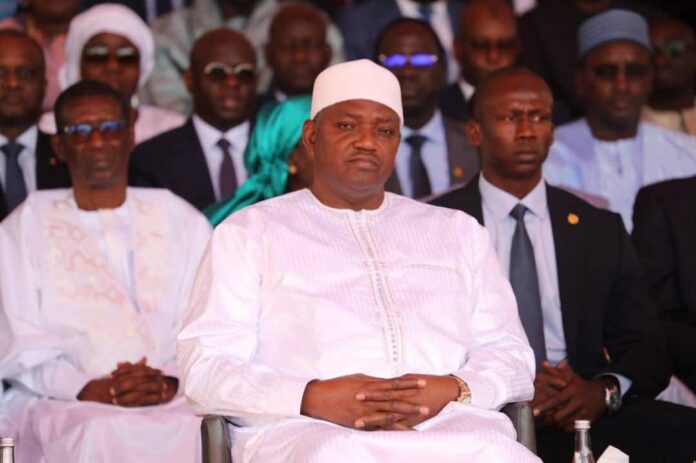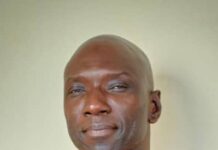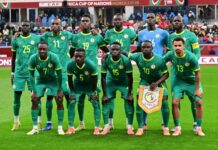President Adama Barrow’s recent remarks targeting imams and journalists have sparked a firestorm of debate in The Gambia, raising critical questions about the boundaries of free expression, the role of public critique, and leadership responsibilities in a fledgling democracy.
Speaking at a meeting with Muslim elders during Eid-ul-Fitr, Barrow chastised imams for sermons he claims misrepresent his government’s actions and accused journalists of focusing solely on negative stories, neglecting the good his administration has achieved. His comments—pointed and unapologetic—reveal a leader frustrated by narratives he cannot control. But beneath this frustration lies a deeper tension: Is Barrow holding a mirror to society’s influencers, or is he attempting to muzzle them?
Let’s begin with the imams. Barrow’s assertion that some use their pulpits to “unfairly chastise” his government and deliver sermons that “could incite violence” is a serious charge. Religious leaders wield immense influence in The Gambia, a nation where faith shapes personal and public life. If Barrow’s critique is rooted in evidence—if imams are indeed stoking unrest with politically charged rhetoric—then his call for accountability is not without merit. Leaders of all stripes, religious or otherwise, must recognize the weight of their words in a country still healing from decades of authoritarian rule under Yahya Jammeh. Yet Barrow offers no specifics or examples of sermons crossed this line. Without transparency, his words risk being perceived as a blanket warning to clerics: toe the government line or face scrutiny. This ambiguity is dangerous—it echoes the very tactics of the past regime, where dissent was stifled under vague accusations of destabilization.
Then there are the journalists, whom Barrow accuses of writing “only negative stories” about his government. It’s a familiar lament from those in power but demands scrutiny. At its best, journalism is not a cheerleading squad for any administration—it is a watchdog tasked with exposing flaws, amplifying the voiceless, and holding leaders to account. Barrow’s government has made strides since 2017: infrastructure projects, economic reforms, and a commitment to democratic transition are real achievements. But progress does not erase problems—corruption allegations, unemployment, and uneven development persist. If journalists focus on these issues, it’s not necessarily bias; it’s their job. To demand they highlight only the “good” risks, turning the press into a propaganda arm, a role it played under Jammeh to disastrous effect. Barrow’s rise to power was fueled by a free media that exposed tyranny—does he now wish to clip its wings when the spotlight turns on him?
The subtext of Barrow’s comments is equally troubling. By singling out imams and journalists—two groups with the power to shape public perception—he signals a discomfort with narratives beyond his control. This is not unique to Barrow; leaders worldwide grapple with the cacophony of free societies. However, in The Gambia, where democratic institutions remain fragile, such rhetoric carries extra weight. Barrow’s predecessor silenced dissent with prisons and bullets; Barrow, so far, uses words. Yet the leap from verbal reprimands to legal restrictions is not long. His remarks about civil servants “undermining” his government in the same speech suggest a broader pattern: a leader increasingly impatient with opposition, whether from the mosque, the newsroom, or his ranks.
Another angle to consider: Barrow’s critique might reflect a genuine plea for fairness. Governing is no easy task, and The Gambia’s challenges—poverty, global economic pressures, a legacy of misrule—are daunting. Perhaps Barrow feels the good faith of his efforts is drowned out by relentless criticism. Imams could, in theory, use their moral authority to foster unity rather than division. Journalists could balance exposés with acknowledgment of progress. But here’s the rub: neither group answers to the president. Imams serve their faith and communities; journalists serve the truth and the public. Barrow’s role is not to dictate their output but to engage with it—through dialogue, not denunciation.
The thought-provoking crux of this saga lies in its implications for The Gambia’s democratic experiment. Barrow’s comments test the nation’s commitment to pluralism. Can a government born from a rejection of tyranny tolerate the messiness of free thought? Can it withstand sermons that sting and headlines that bruise? Conversely, can imams and journalists rise above petty agendas to wield their influence responsibly? The answers will shape not just Barrow’s legacy but the soul of a nation striving to define itself.
For now, Barrow would do well to reflect on his own words. Leadership in a democracy is not about silencing critics—it’s about proving them wrong through action. If he believes his government’s good is underreported, let him open the books, invite the cameras, and show the evidence. If he fears sermons sow discord, let him meet the imams, not admonish them from afar. The Gambia deserves a president who trusts its people to discern truth from noise—not one who seeks to quiet the chorus.





